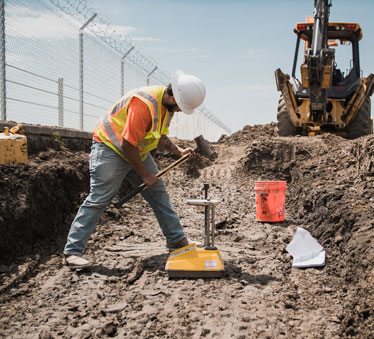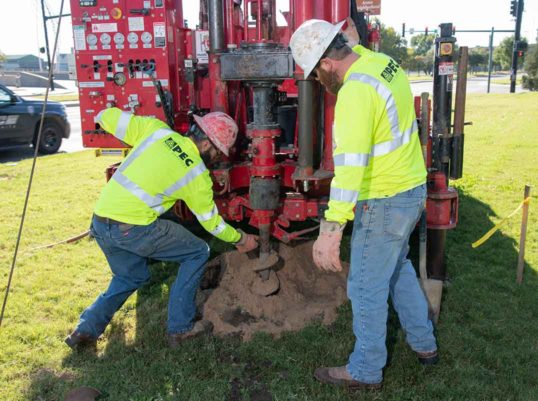Necessary Qualities of Effective Civil Consulting Engineers
Necessary Qualities of Effective Civil Consulting Engineers
Blog Article
A Detailed Summary of the Trick Responsibilities of Geotechnical Engineers in Site Characterization and Ground Renovation Strategies for Design Solutions
Geotechnical engineers are essential to the successful execution of engineering projects, tasked with the important responsibilities of site characterization and the application of ground renovation techniques. Their job involves a detailed evaluation of subsurface conditions, employing various screening techniques to recognize soil and rock residential or commercial properties.
Role of Geotechnical Engineers
Geotechnical designers play a crucial function in the style and building and construction of facilities by analyzing the habits of soil and rock underneath the surface area - geotech engineer. Their responsibilities encompass reviewing subsurface problems to inform style decisions that ensure architectural stability and safety. By performing comprehensive analyses of soil properties, consisting of shear compressibility, toughness, and permeability, geotechnical engineers supply vital data that affects the option of ideal construction products and strategies
Along with evaluating soil technicians, geotechnical engineers are entrusted with identifying possible risks such as landslides, sinkholes, and ground negotiations. Their know-how helps alleviate threats connected with these geotechnical sensations, consequently securing both the setting and public security. They additionally work together closely with other engineering techniques, making sure that geotechnical considerations are incorporated right into total job layout.
Furthermore, geotechnical engineers engage in the assessment of existing frameworks, giving suggestions for retrofitting and repairs when required. Their detailed understanding of soil-structure communication is crucial for the advancement of sustainable facilities remedies. On the whole, the role of geotechnical engineers is indispensable to the successful awareness of building and construction tasks, guaranteeing they are risk-free, sturdy, and certified with governing criteria.

Site Characterization Processes
Efficient website characterization processes are important for recognizing the subsurface conditions that affect project layout and execution. Geotechnical designers employ an organized strategy to collect, review, and translate data pertaining to dirt, groundwater, and rock qualities. This procedure begins with a thorough evaluation of existing literature and historic website data, supplying insights into previous website problems and potential difficulties.

Information analysis adheres to fieldwork, where designers use geostatistical approaches to interpret findings and create geological designs. Via diligent website characterization, geotechnical engineers lay the foundation for effective task execution, enhancing and minimizing unpredicted complications resource allowance.
Dirt and Rock Testing Techniques
While recognizing subsurface conditions is important, the selection of appropriate soil and rock testing methods is similarly essential for accurate analysis and layout. Geotechnical engineers use a variety of testing methods to review the physical and mechanical homes of soil and rock products.
Laboratory tests, such as Atterberg limits, grain size analysis, and unconfined compressive toughness examinations, give essential data on soil habits under different moisture conditions and packing situations. These tests assist figure out dirt category and forecast negotiation or shear stamina characteristics essential for structure style.
In-situ testing methods, including Standard Penetration Examinations (SPT), Cone Infiltration Tests (CPT), and stress meter examinations, allow engineers to gather data directly from the ground. These methods supply valuable insights right into the soil's density, uniformity, and stratification without the demand for extensive tasting.
Rock testing normally entails core sampling and research read review laboratory evaluation to evaluate buildings like uniaxial compressive stamina and rock high quality classification (RQD) With each other, these dirt and rock testing methods enable geotechnical engineers to make enlightened choices concerning site-specific obstacles, making sure the safety and security of engineering remedies.
Ground Improvement Strategies
Ground improvement methods are essential for boosting the engineering residential or commercial properties of dirt, therefore raising its load-bearing ability and decreasing negotiation. These techniques are important in addressing difficulties offered by troublesome or weak dirts, which can considerably impact the stability and resilience of frameworks.
Various ground improvement methods are employed, including compaction, grouting, and dirt stablizing. go now Compaction involves raising the thickness of dirt through mechanical ways, which boosts its shear toughness and reduces compressibility. Grouting, on the other hand, includes infusing a fluid material right into the ground to load voids and improve dirt cohesion. This technique is especially reliable for dealing with loose sands or broken rock.
Dirt stablizing encompasses a series of methods, from chemical additives to mechanical treatments, focused on enhancing the dirt's resistance to disintegration and contortion. Strategies such as lime stablizing or cement mixing alter the residential or commercial properties of the soil at a bit degree, boosting its total efficiency.
Value of Geotechnical Analyses
Geotechnical evaluations play a crucial function in the preparation and style of engineering projects, as they provide crucial details regarding the subsurface conditions. Recognizing dirt residential or commercial properties, rock formations, groundwater degrees, and prospective geohazards is vital for ensuring the security and safety and security of frameworks. These evaluations make it possible for designers to make informed decisions regarding website choice, design criteria, and building and construction methodologies.
The significance of geotechnical analyses expands beyond first project phases; they are important in risk management and cost efficiency. By identifying prospective concerns early, such as dirt settlement, incline instability, or extreme groundwater, engineers can develop ideal mitigation strategies, decreasing the possibility of structural failures and expensive delays. Additionally, these assessments support conformity with governing demands and enhance the sustainability of design techniques.

Conclusion
In final thought, geotechnical engineers are essential to ensuring the safety and stability of engineering jobs through thorough site characterization and ground renovation methods. geotechnical eng. Their organized method to assessing subsurface problems, integrated with their referrals for effective ground adjustment, considerably boosts soil homes and load-bearing ability. The experience of geotechnical engineers not just facilitates educated job planning yet also guarantees conformity with guidelines and promotes efficient interaction amongst stakeholders, ultimately adding to effective design outcomes
Geotechnical engineers play an essential function in the design and building of framework by assessing the behavior of dirt and rock below the surface. By carrying out thorough evaluations of dirt residential properties, consisting of shear compressibility, permeability, and strength, geotechnical engineers give critical data that influences the option of appropriate building and construction products and techniques.
In enhancement to examining soil mechanics, geotechnical designers are entrusted with identifying prospective risks such as landslides, sinkholes, and ground settlements. Geotechnical engineers use an organized technique to collect, review, and interpret data concerning soil, groundwater, and rock features. By recognizing prospective issues early, such as dirt negotiation, slope instability, or excessive groundwater, designers can create suitable mitigation techniques, decreasing the chance of expensive hold-ups and architectural failures.
Report this page